With the BJP government at the Centre focused upon containing the disastrous fallout of the demonetisation initiative on the Indian economy, and preoccupied with implementation of GST countrywide, the important issue of reform of early childhood, primary-secondary and higher education was severely neglected - Summiya Yasmeen
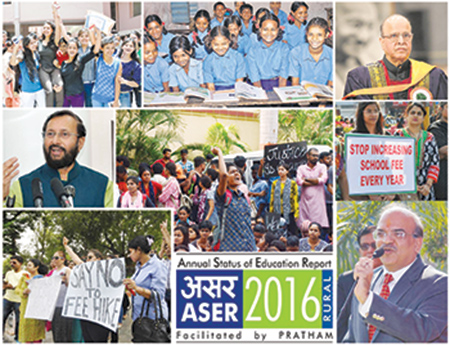 2017 was a quiet year for Indian education. With the Narendra Modi-led BJP government at the Centre focused upon containing the disastrous fallout of the demonetisation initiative announced in November 2016 on the Indian economy, and preoccupied with implementation of its biggest tax reform — the Goods and Services Tax (GST) — countrywide, the important issue of upgradation and reform of early childhood, primary-secondary and higher education was severely neglected. Moreover with three big states — Uttar Pradesh, Gujarat and Himachal Pradesh — going to the hustings last year, the entire BJP machinery was in election overdrive. While in Uttar Pradesh and Himachal, the BJP swept the state legislative assembly elections with overwhelming majorities, in Gujarat its victory margin was substantially reduced with a resurgent Congress giving it a good fight.
2017 was a quiet year for Indian education. With the Narendra Modi-led BJP government at the Centre focused upon containing the disastrous fallout of the demonetisation initiative announced in November 2016 on the Indian economy, and preoccupied with implementation of its biggest tax reform — the Goods and Services Tax (GST) — countrywide, the important issue of upgradation and reform of early childhood, primary-secondary and higher education was severely neglected. Moreover with three big states — Uttar Pradesh, Gujarat and Himachal Pradesh — going to the hustings last year, the entire BJP machinery was in election overdrive. While in Uttar Pradesh and Himachal, the BJP swept the state legislative assembly elections with overwhelming majorities, in Gujarat its victory margin was substantially reduced with a resurgent Congress giving it a good fight.
Consequently as economic and political events took centrestage, education was relegated to the bottom of the government national agenda in the past year. The unassuming Prakash Javadekar, who was appointed Union minister of human resource development (HRD) in July 2016, after his predecessor the mercurial Smriti Irani was shifted to the textiles ministry in a cabinet reshuffle, failed to make any major impact on Indian education. Like Irani, who was heavily influenced by the extreme right-revivalist Rashtriya Swayamsevak Sangh (RSS) — the ideological parent of the BJP — Javadekar dismissed the somewhat inconvenient recommendations of the comprehensive 200-page TSR Subramanian Committee Report on the National Education Policy (NEP) 2016, and appointed a reconstituted committee under the chairmanship of eminent scientist Dr. R. Kasturirangan to prepare a new draft of the long-awaited NEP. The deliberations for preparing a new NEP began in 2015 soon after the BJP came to power, and Javadekar had promised to present the NEP to the nation by end 2017 — a deadline unlikely to be met. Ditto his commitment to tabling a Bill in Parliament to rescind the Right to Education Act’s no-detention in primary school provision and introduce exams in classes V and VIII, came to naught the past year.
Javadekar’s only major achievement in 2017 was enactment of the Indian Institutes of Management (IIM) Bill, 2017 by Parliament. Under his leadership, the HRD ministry reworked Irani’s controversial IIM Bill, 2015 which proposed to drastically dilute the academic and financial autonomy of the IIMs. The IIM Bill, 2017 provides autonomy to the country’s premier business management schools by restricting the government’s role in their functioning and grants them statutory powers to appoint directors, faculty members and award degrees instead of postgraduate diplomas. Javadekar must also be given credit for the Union cabinet clearing the establishment of the National Testing Agency, a centralised body which will conduct admission entrance tests for all institutions of higher education.
Even as the minister unlike his foot-in-mouth predecessor Irani remained controversy-free, the HRD ministry-managed Central Board of Secondary Education (CBSE) — the country’s largest pan-India school exams board — made media headlines through the year for issuing a spate of arbitrary diktats to its 19,316 affiliated schools including 14,860 private schools. Indeed, the highlight of 2017 is government tightening its noose around the country’s estimated 320,000 private schools. In Gujarat, the state’s BJP government passed the Gujarat Self-financed Schools (Regulation of Fees) Act, 2017 under which all private schools are subject to tuition fee ceilings, while in Delhi the AAP government issued a takeover/nationalisation threat to 449 private schools in the national capital for failing to refund ‘excess’ tuition fees. Moreover, the spectre of the RSS and its saffronisation agenda hovered over Indian education, with school textbooks in BJP-ruled states being rewritten with abandon to project its hindutva ideology.
In higher education too, the picture is dismal. According to the HRD ministry, the country’s Central universities are facing a faculty shortage of 53.28 percent; the NITs report 47 percent teacher vacancies and the IITs 35 percent. However on the bright side, for the first time an Indian university — IIT-Bombay — was ranked in the Top 10 table of QS’ BRICS (Brazil, Russia, India, China and South Africa) University Rankings 2018.
In the following pages, we present the education landmarks of 2017. (EducationWorld’s more detailed coverage of almost all milestone events of 2017 noted below can also be accessed at www.educationworld.in Archives).
ASER 2016 survey
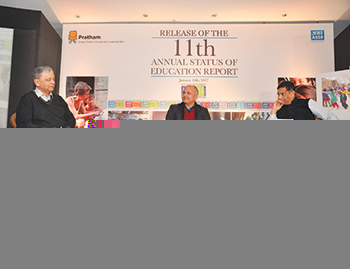 January 18. The Annual Status of Education Report (ASER) 2016 of the Mumbai-based Pratham Education Foundation (estb.1994) — published after skipping a year — was formally released in Delhi. A survey of learning outcomes of primary school children in rural India, ASER 2016 indicates that the continuous slide in primary education in rural India seems to have been halted, with children’s reading and arithmetic capability improving marginally. It also reports improved infrastructure, particularly in toilets and drinking water availability. Interestingly, the report says there was no significant increase in private school enrolment between 2014 and 2016.
January 18. The Annual Status of Education Report (ASER) 2016 of the Mumbai-based Pratham Education Foundation (estb.1994) — published after skipping a year — was formally released in Delhi. A survey of learning outcomes of primary school children in rural India, ASER 2016 indicates that the continuous slide in primary education in rural India seems to have been halted, with children’s reading and arithmetic capability improving marginally. It also reports improved infrastructure, particularly in toilets and drinking water availability. Interestingly, the report says there was no significant increase in private school enrolment between 2014 and 2016.
Nationally, the proportion of children in class II who are capable of reading class I level texts has risen marginally from 40.2 percent in 2014 to 42.55 percent in 2016. Numeracy learning outcomes also show an upward trend for the first time since 2010. The percentage of class III children who can solve two-digit subtraction sums has increased to 27.7 percent from 25.4 percent in 2014. However, the capability of class VIII students to solve simple division sums has continued to drop, a trend observed since 2010.
The 2016 survey involved the mobilisation of a massive field force of 25,000 volunteers (mainly college students) who fanned out across 589 rural districts to test the unprepared literacy and numeracy capability of a representative sample of 562,305 children (in the age group 3-16) in 17,473 rural habitations, making it the largest learning assessment survey countrywide. (Education News, EW February 2017)
Union budget’s grudging allocation for education
February 1. Union finance minister Arun Jaitley presented the Union Budget of the Narendra Modi-led BJP/NDA government to Parliament on the first day of the month, as opposed to the traditional date of February 28. But the new date (and amalgamation of the hitherto separate Indian Railways budget into the Union budget) apart, there was little to distinguish this budget from the Union budgets of preceding finance ministers. Once again, the Centre’s allocation for education at Rs.79,686 crore to build the nation’s human capital was pathetically inadequate.
Although this allocation is 9 percent higher than in 2016-17, it’s lower than the Rs.82,771 crore budgeted (but not spent) by the UPA-II government in 2015-16, and aggregates a mere 0.47 percent of GDP (0.48 in 2016-17). Similarly, token increments which barely cover price inflation were doled out in Budget 2017-18. For the Sarva Shiksha Abhiyaan (primary education for all) programme, the allocation is Rs.23,500 crore; Rs.3,830 crore for public secondary education; Rs.1,300 crore for RUSA (a programme for higher education), and a mere Rs.986 crore for teacher training and adult education. The overall provision made by Jaitley of Rs.79,686 crore in the Budget as the Central government’s contribution for national education is grossly inadequate and completely divorced from the needs of the world’s largest (550 million) child and youth population. (Special Report, EW March)
Delhi high court verdict on nursery admissions
February 14 and 27. The Delhi high court refused to vacate its stay order on a January 7 Delhi state government notification. The notification decreed admission criteria for 298 schools constructed on land provided at concessional prices by the Delhi Development Authority, leaving the other 15,800 composite schools in the national capital free to admit nursery children according to their own criteria.
The January 9 notification had directed the 298 schools to give priority to children residing within a 1 km circumference of school premises. If seats remain vacant, the catchment area could be expanded to 3 and 6 km. It also directed the schools to give weightage to siblings of children admitted.
While refusing to vacate the stay order, Justice Manmohan explained that the power to choose schools for their children vests with parents and school managements, not the government and that the “impugned notification completely takes away from private unaided schools the right to admit students”. (Education News, EW March)
AAP’s education priority
March 8. Presenting the Aam Aadmi Party’s third budget of the Delhi state government, Manish Sisodia, deputy chief, finance and education minister announced an allocation of Rs.11,300 crore for education — equivalent to 23.5 percent of the total Rs.48,000 crore budget. For three consecutive years since 2015 — when it was unexpectedly swept to power routing the BJP — the AAP state government has been allocating a rising share (Rs.9,836 crore in 2015 and Rs.10,600 crore in 2016) of the state’s annual budgetary expenditure to education.
Major highlights of the Delhi state education budget for 2017-18 include establishment of libraries in 400 government secondaries and a special library for each classroom of primaries (Rs.417 crore); setting up ten early childhood education centres for children in the two-six years age group (Rs.4 crore); introduction of pre-primary education in 156 government schools; and plans to promote five Schools of Excellence with English as the medium of instruction. In his budget speech, Sisodia also announced setting up of two new District Institutes of Education and Training (DIETs) to add to the nine currently, and a high quality Teacher Training Institute affiliated with the city’s Ambedkar University to address the crisis of chronic shortage of quality teachers. (Education News, EW April)
Karnataka anganwadi workers’ strike
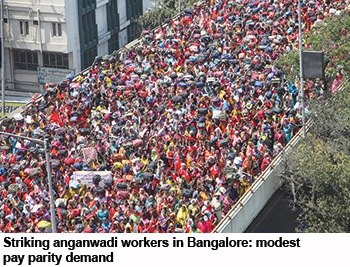 March 20. An estimated 10,000 anganwadi centre (AWC) workers and helpers — the majority of them women — employed in Karnataka’s 64,558 AWCs (Central government preschools) staged a four-day round-the-clock sit-down strike before chief minister Siddaramaiah’s sprawling official residence in Bangalore. Their demand was a modest increase in monthly remuneration to place them on a par with AWC workers and helpers in the neighbouring states of Tamil Nadu, Kerala and Goa where they are paid Rs.14,000 and Rs.10,000 per month. Against this, AWC workers and helpers in Karnataka receive Rs.7,000 and Rs.3,500 respectively.
March 20. An estimated 10,000 anganwadi centre (AWC) workers and helpers — the majority of them women — employed in Karnataka’s 64,558 AWCs (Central government preschools) staged a four-day round-the-clock sit-down strike before chief minister Siddaramaiah’s sprawling official residence in Bangalore. Their demand was a modest increase in monthly remuneration to place them on a par with AWC workers and helpers in the neighbouring states of Tamil Nadu, Kerala and Goa where they are paid Rs.14,000 and Rs.10,000 per month. Against this, AWC workers and helpers in Karnataka receive Rs.7,000 and Rs.3,500 respectively.
Siddaramaiah who is also finance minister, rejected this request stating that in the Union Budget 2016-17, the Central government had slashed its ICDS (Integrated Child Development Services) annual outlay and imposed an unreasonable burden on state governments. However on March 23, after the third day of round-the-clock sit-down protests, the 10,000 AWC workers and helpers called off their agitation after receiving an assurance that their demand for wage parity with their counterparts in neighbouring states will be reconsidered by the chief minister before April 10. (Education News, EW April)
CBSE makes class X exam mandatory
March 21. The Delhi-based Central Board of Secondary Education (CBSE) — the country’s largest national school-leaving examinations board which has 19,316 schools in India and abroad affiliated with it — issued a circular making the class X exam compulsory for all CBSE schools from the new academic year 2017-18 beginning in June/July. In 2010, CBSE had made the class X exam optional at the behest of former Union HRD minister Kapil Sibal.
Schools were directed to issue report cards (aka marks sheets) in the prescribed format provided with the circular. Under the new schema, children in classes VI-VIII will write two half-yearly term exams annually. The March 21 circular also limits the freedom of teachers, by directing them to choose mathematics, science and social science project assignments from the CBSE website and prescribe NCERT textbooks. (Education News, EW April)
Gujarat regulates private school fees
March 30. The Gujarat state assembly passed the Gujarat Self-financed Schools (Regulation of Fees) Act, 2017. Under the Act, private primary, secondary and higher secondary schools including schools affiliated with CISCE, CBSE, international and state boards, are subject to tuition fee ceilings — Rs.15,000 per year for primaries, Rs.25,000 for secondaries, and Rs.27,000 for higher secondaries. Private independent schools levying fees beyond these ceilings need to justify higher fees to one of four Zonal Fee Regulation Committees comprising retired court judges and civil servants appointed by the state government.
The legislation of this Act by the state’s BJP government threw 2,000 private schools of the state in a ferment and prompted their representative associations to challenge it in the Gujarat high court. (Education News, EW September)
NCERT books only diktat for CBSE schools
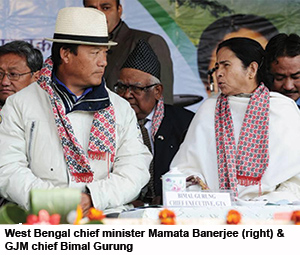 April 19. The Delhi-based Central Board of Secondary Education (CBSE) issued a circular to its 19,316 — including 14,860 private unaided — affiliated schools countrywide to refrain from advising parents to buy books, uniforms, shoes, bags etc from selected vendors and “use only the textbooks issued by the Delhi-based National Council of Educational Research and Training,” an autonomous body also under the supervisory jurisdiction of the Union HRD ministry. Citing rule 19.1 (ii) of its bye-laws, it said “managements shall ensure that school is run as a community service and not as a business and that commercialisation does not take place in the school in any shape whatsoever.”
April 19. The Delhi-based Central Board of Secondary Education (CBSE) issued a circular to its 19,316 — including 14,860 private unaided — affiliated schools countrywide to refrain from advising parents to buy books, uniforms, shoes, bags etc from selected vendors and “use only the textbooks issued by the Delhi-based National Council of Educational Research and Training,” an autonomous body also under the supervisory jurisdiction of the Union HRD ministry. Citing rule 19.1 (ii) of its bye-laws, it said “managements shall ensure that school is run as a community service and not as a business and that commercialisation does not take place in the school in any shape whatsoever.”
However, on July 30 the Madras high court stayed this circular restraining affiliated schools from using privately published textbooks. (Education News, EW May)
EW India Private Higher Education Rankings 2017
May 7. Manipal University and Amity University, Noida, were jointly ranked India’s #1 private universities; BITS-Pilani the #1 private engineering university and XLRI, Jamshedpur, the country’s #1 private B-school, in the EW India Private Higher Education Rankings 2017-18 commissioned by EducationWorld, and conducted by the Delhi-based market research and opinion polling company, C fore.
Over 100 C fore field personnel polled a sample database of 4,465 well-informed individuals including 2,133 academics, 1,368 final year students and 964 managers of Indian industry, and persuaded them to rate the country’s Top 100 private universities, engineering colleges and B-schools across seven parameters of academic excellence. The scores awarded on a scale of 1-100 under each parameter by the sample respondents were totalled by C fore to rank institutions inter se in each category. (Cover story, EW May)
Bengali compulsory language controversy
May 16. The Trinamool Congress (TMC) government’s education minister Partha Chatterjee announced that Bengali will become a compulsory subject in classes I-X of all 92,000 government and over 8,000 private schools — regardless of exam board affiliation — in West Bengal in the new academic year 2017-18.
This out-of-the-blue announcement of the TMC government enraged the Nepali speaking Gorkha majority in the Darjeeling hill areas of the state where the writ of the Gorkha Janmukti Morcha (GJM), a political party which has been demanding a separate state (Gorkhaland) for the Nepali majority since 2007, runs large. With chief minister Mamata Banerjee refusing to withdraw the government resolution and insisting on holding a full cabinet meeting in Darjeeling on June 8, GJM leader Bimal Gurung announced an indefinite strike. The GJM general strike forced shutdown of all 48 schools in the Darjeeling hills indefinitely including high-end vintage boarding schools such as St. Paul’s, St. Joseph’s North Point, Darjeeling, Himali Boarding and Goethal Memorial, Kurseong.
After a record-breaking 104 days, the GJM called off the strike on September 27. This longest ever continuous general strike in the hill regions dealt a severe blow to private education in West Bengal. (Education News, EW June)
Delhi high court reinstates CBSE’s moderation policy
May 23. A two-judge bench of the Delhi high court passed strictures against the Central Board of Secondary Education (CBSE) for hastily abolishing its moderation policy (which allows examiners to award grace marks when question papers are unusually difficult) after students had completed writing the class XII exam in end April. Describing CBSE’s scrapping of the moderation policy as “unfair and irresponsible”, the court directed the board to continue with the policy while marking the answer papers of 900,000 class X and 1.1 million class XII students who wrote the CBSE examinations between March 9 and April 29.
“Grave and irreparable loss and damage would endure (sic) to the students if interim relief is not granted. It needs no elaboration that rules of the game cannot be changed after the game has begun,” said the order of the two-judge bench restraining CBSE examiners from making any changes in the moderation policy in the academic year ended April 30, 2017. (Education News, EW June)
National Education Policy new committee appointed
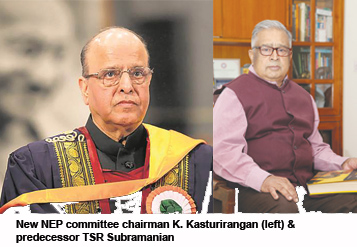 June 26. The Union HRD ministry appointed eminent scientist K. Kasturirangan as chairman of a new committee to prepare the final draft of the National Education Policy (NEP). The committee comprises eight members including Vasudha Kamat, vice chancellor of SNDT University, Mumbai; retired bureaucrat K.J. Alphonse; Princeton University mathematics professor Manjul Bhargava; Ram Shankar Kureel, vice chancellor of the Baba Saheb Ambedkar University of Social Sciences, Mhau; T.V. Kattamani, vice chancellor of the Tribal University, Amarkantak; K.M. Tripathy from Uttar Pradesh; Mazhar Asif, Gauhati University Persian language professor and CABE member M.K. Shridhar.
June 26. The Union HRD ministry appointed eminent scientist K. Kasturirangan as chairman of a new committee to prepare the final draft of the National Education Policy (NEP). The committee comprises eight members including Vasudha Kamat, vice chancellor of SNDT University, Mumbai; retired bureaucrat K.J. Alphonse; Princeton University mathematics professor Manjul Bhargava; Ram Shankar Kureel, vice chancellor of the Baba Saheb Ambedkar University of Social Sciences, Mhau; T.V. Kattamani, vice chancellor of the Tribal University, Amarkantak; K.M. Tripathy from Uttar Pradesh; Mazhar Asif, Gauhati University Persian language professor and CABE member M.K. Shridhar.
The Kasturirangan Committee’s brief is to examine thousands of suggestions received from educationists, teachers, experts, students and other stakeholders from across the country — together with the inputs offered by the TSR Subramanian Committee — and submit the final NEP draft to the HRD ministry by December end. However, as we go to press, the committee has sought a three-month extension till March 2018.
Tamil Nadu NEET reservation order
June 25. The AIADMK government of Tamil Nadu issued an order reserving 85 percent of seats in the state’s 22 government and 10 private medical colleges, and four government and 21 private dental colleges for class XII students of schools affiliated with the Tamil Nadu State Board of School Education (TNSBSE) who have qualified in NEET (National Eligibility-cum-Entrance Test) 2017, and 15 percent seats for CBSE students.
The objective of the AIADMK’s reservation order was to ensure that state board students aren’t shut out of medical and dental colleges in Tamil Nadu. There’s pervasive fear that because of a relatively weak curriculum and poor academic standards in the state’s 53,000 government and 10,934 private schools affiliated with the TNSBSE, the majority of students in Tamil Nadu’s medical colleges will be out-of-state or students from the pan-India CISCE and CBSE schools.
However on July 14, a single judge of the Madras high court quashed the government’s reservation order, slamming the state government for meting out step-motherly treatment to CBSE-affiliated school students. (Education News, EW July and August)
School services exempted from GST
July 1. The BJP government at the Centre rolled out the Goods and Services Tax (GST) countrywide. Touted as one of the biggest economic reforms since liberalisation (1991), GST replaces multiple cascading indirect taxes levied by the Central and state governments.
With widespread panic among parents that education will be subject to GST, in a statement issued on July 8, the Union finance ministry clarified that schools up to higher secondary and most of the services provided to educational institutions are exempt from taxation under GST. The statement also clarified that services provided by educational institutions to students, faculty and staff, admission and examination as well as security, cleaning and housekeeping services are exempt from GST.
However, under the Goods and Services Tax Act, higher education institutions are obliged to pay 18 percent tax on outsourced services.
Mumbai University’s online evaluation mess
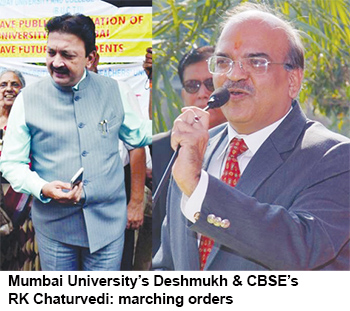 July 16. Widespread protests were staged by students, parents and political parties in Mumbai against delay in announcement of results for undergrad and postgraduate examinations by Mumbai University. The delay has impacted 425,000 students who wrote their exams in March. In response to the protests, Maharashtra governor C.V. Rao, ex officio chancellor of the university, set July 31 as the deadline for declaration of all results. However, with the university’s administration failing to complete the formidable task of correcting 1.75 million answer scripts within the deadline, the public outcry against the delay resonated within the state’s legislative assembly with academics, student unions and political parties demanding the resignation of vice chancellor Sanjay Deshmukh.
July 16. Widespread protests were staged by students, parents and political parties in Mumbai against delay in announcement of results for undergrad and postgraduate examinations by Mumbai University. The delay has impacted 425,000 students who wrote their exams in March. In response to the protests, Maharashtra governor C.V. Rao, ex officio chancellor of the university, set July 31 as the deadline for declaration of all results. However, with the university’s administration failing to complete the formidable task of correcting 1.75 million answer scripts within the deadline, the public outcry against the delay resonated within the state’s legislative assembly with academics, student unions and political parties demanding the resignation of vice chancellor Sanjay Deshmukh.
Consequently, Deshmukh, accused of unilaterally deciding to overhaul the manual evaluation system and replace it with an online evaluation system, was sacked in August — the first ever VC to be fired in the university’s history. (Education News, EW August)
AAP’s private schools takeover threat
August 16. The Aam Aadmi Party (AAP) government of Delhi State published a list of 449 ‘defaulting’ private schools which have failed to refund ‘excess fees’ and initiated takeover/nationalisation proceedings against them.
This standoff between the AAP government and Delhi’s private schools has its origins in the appointment of the Justice Anil Dev Singh committee in 2011 to investigate schools which had raised tuition fees on the plea that they were compelled to do so because following the 5th (1997) and 6th Pay Commission (2007) awards which stipulated higher teachers’ salaries, their expenditure had risen commensurately.
Based on the Anil Dev Committee’s ten interim reports, which completed inspection of over 1,000 private schools thus far, the Delhi government had ordered the schools to refund excess fees to parents as certified by the committee. However, 449 of them have ignored the government’s directives despite repeated reminders, prompting the takeover threat. (Education News, EW September)
CBSE chairman R.K. Chaturvedi transferred
September 1. R.K. Chaturvedi, chairman of the Delhi-based Central Board of Secondary Education (CBSE), was transferred overnight to the National Skill Development Agency. He was replaced by 1988-batch Gujarat cadre officer Anita Karwal.
Chaturvedi, appointed chairman of CBSE for a five-year term on July 14, 2016, had a controversial innings as the head of India’s largest national school examinations board. In December 2016 shortly after he was appointed, CBSE issued two circulars amending its bye-laws to appoint a CBSE nominee (with veto powers) to the selection committees of affiliated schools which recruit headmasters and principals.
Following a spate of writ petitions filed protesting dilution of the autonomy of affiliated schools and a cover story in EducationWorld (‘Brewing revolt against control-and-command CBSE’, February 2017), the circulars were put in cold storage. Subsequently on May 23, the Delhi high court pulled up the board for peremptorily scrapping its long-standing moderation policy under which students have traditionally been awarded ‘grace’ marks when question papers are unusually difficult. (Cover story, EW February)
EW India School Rankings 2017-18
September 7. Step by Step School, Noida (day co-ed); DPS, R.K. Puram, Delhi, and Greenwood High, Bangalore (day-cum-boarding), J.B. Petit School for Girls, Mumbai (all-girls) and Campion School, Mumbai (all-boys) were ranked India’s most admired day schools in their categories in the ninth EducationWorld India School Rankings 2017-18.
Rishi Valley School, Chittoor (co-ed), Scindia Kanya Vidyalaya, Gwalior (all-girls), and The Doon School, Dehradun (all-boys) were ranked #1 in the traditional/legacy boarding schools category. Among international schools, Dhirubhai Ambani International, Mumbai (day), Indus International, Bangalore (day-cum-boarding), and Woodstock School, Mussoorie (wholly residential) were top ranked. Moreover, Top 10 government day and residential schools, special needs and budget private schools were separately ranked inter se in the world’s largest survey of primary-secondary schools.
A total of 12,367 SEC (socio-economic category) ‘A’ fees-paying parents, teachers, principals and educationists in 27 cities countrywide were interviewed by 127 field researchers of the Delhi-based C fore who rated the country’s sufficiently high profile day, boarding and international primary-secondary schools in 14 categories. (Cover story, EW September)
Ryan International student murder shock
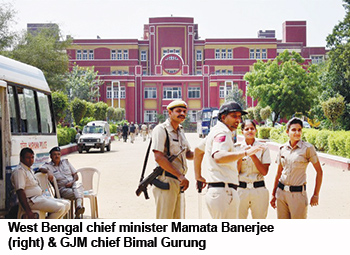 September 8. Pradyuman Thakur, a seven-year-old class II student of Ryan International School, Gurgaon, was found dead in the school toilet with his throat slit, allegedly by the school bus conductor.
September 8. Pradyuman Thakur, a seven-year-old class II student of Ryan International School, Gurgaon, was found dead in the school toilet with his throat slit, allegedly by the school bus conductor.
The gruesome murder caused widespread middle class and media outrage, focusing national attention on the issue of child safety as never before and also beamed the spotlight on the Mumbai-based Ryan International Group of Institutions (RIGI) — India’s largest chain of proprietorial K-12 schools with 135 schools in India with an aggregate enrolment of 270,000 students and 12,000 teachers — whose promoters were subject to a vicious media trial.
However, in a sensational twist to the case, on November 9, the Central Bureau of Investigation (CBI) arrested a class XI student of the school in connection with the murder of Pradyuman. According to the CBI, the student, believed to be weak in studies, allegedly slit Pradyuman’s throat to get the school to declare a holiday and defer an examination. Against the backdrop of this new development, the bus conductor Ashok Kumar was granted bail by the Gurugram district court on November 21. (Education News, EW October).
BHU erupts in women safety protests
September 24. A peaceful protest of women students of the 101-year-old Benares Hindu University (BHU), sited in Varanasi, the parliamentary constituency of prime minister Narendra Modi — demanding justice for a fellow student who had been sexually harassed and safer campus conditions for women — resulted in their being chased and thrashed by lathi-wielding policemen.
Later, the protesting women students presented a charter of demands — all-night deployment of security guards on the campus, adequate lighting on girls’ hostel grounds and installation of CCTV cameras across the campus — to BHU vice chancellor Girish Chandra Tripathi. However, instead of acceding to their legitimate demands, in a closed-door meeting with a delegation of women students, Tripathi reportedly admonished them for blowing up a mere “eve-teasing incident” and besmirching the reputation of the prestigious university. (Education News, EW October).
Unesco Global Education Monitoring Report
October 24. The Global Education Monitoring (GEM) Report 2017-18 was released in Paris by Unesco. Among the highlights of GEM Report are a call upon governments to design accountability systems for schools and teachers which are supportive of children and avoid punitive mechanisms especially those based on narrow performance measures; allow democratic participation; respect media freedom to scrutinise education, and establish independent institutions to hear complaints.
On India, GEM 2017-18 made some specific observations. It acknowledges that following a Supreme Court ruling, since 2003 government agencies have started producing extensive content on environmental education, which has resulted in over 300 million students in 1.3 million schools receiving introduction to environmental education. It also highlights a Supreme Court ruling which enabled an additional 350,000 girl children to attend school. (Education News, EW November)
TN releases new school syllabus
November 20. The ruling AIADMK government released the draft of a new syllabus for 53,000 government and 10,934 private schools affiliated with the Tamil Nadu State Board of School Education (TNSBSE). The new syllabus has been revised by the State Council for Educational Research and Training (SCERT) after a time gap of 12 years for higher secondary (classes XI and XII) school and of seven years for classes I to X.
According to state school education secretary T. Udayachandran, the revised syllabus rectifies the deficiencies of the earlier class I-X samacheerkalvi (common curriculum) and the higher secondary TNSBSE syllabuses which were widely criticised for encouraging learning by rote at the cost of developing critical analytical skills necessary to write national entrance examinations such as IIT-JEE and NEET. The new curriculum/syllabus is expected to be rolled out in phases beginning with classes I, VI, IX and XI from the start of the academic year 2018-19. (Education News, EW November)
QS BRICS University Rankings 2018
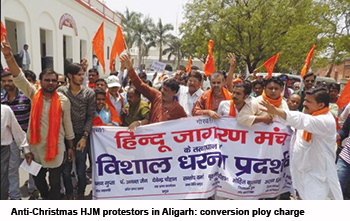 November 22. The latest QS BRICS (Brazil, Russia, India, China, South Africa) University Rankings 2018 were released in London. For the first time, 65 Indian higher education institutions have made it into the Top 300 league table of the annual QS BRICS Rankings 2018 topped by Chinese universities. Tsinghua University, Beijing, has retained its #1 ranking and a record seven Chinese universities are ranked within the Top 10.
November 22. The latest QS BRICS (Brazil, Russia, India, China, South Africa) University Rankings 2018 were released in London. For the first time, 65 Indian higher education institutions have made it into the Top 300 league table of the annual QS BRICS Rankings 2018 topped by Chinese universities. Tsinghua University, Beijing, has retained its #1 ranking and a record seven Chinese universities are ranked within the Top 10.
The Indian Institute of Technology, Bombay (IIT-Bombay) is ranked four notches higher at #9 in 2018 and one notch above the Indian Institute of Science, Bangalore (estb.1904) as the highest-ranked ‘university’ in India.
Among the Top 300 BRICS universities, Delhi University is ranked #41, University of Calcutta #64, Jadavpur University #74, University of Mumbai #82 and Anna University, Chennai #85. IIT-Kanpur, IIT-Kharagpur, IIT-Roorkee, IIT-Guwahati and IIT-Hyderabad also figure among the Top 100. Among private universities, BITS Pilani is ranked #109, Manipal University #119 and Thapar University, Patiala #137. (Education News, EW December)
National Testing Agency approved
December 19. The Union Cabinet cleared the establishment of a National Testing Agency (NTA) to conduct all pan-India higher education admission entrance tests. The NTA will receive a one-time grant of Rs.25 crore from the Centre to start its operations. Thereafter, it will function on a self-sustaining model. “The NTA will initially conduct all entrance exams which are conducted by CBSE. Other examinations will be taken up gradually by the NTA. The exams will be conducted online at least twice a year, thereby giving adequate opportunity to candidates to bring out their best,” said Upendra Kushwaha, Union minister of state for HRD.
The establishment of NTA will benefit an estimated 4 million students who write various annual entrance examinations countrywide and will free CBSE, AICTE, IITs, IIMs and other agencies from examination and assessment duties thus allowing them to focus on their core mandate of education and research provision.
Hindu group warns Aligarh schools against celebrating Christmas
December 20. The RSS-affiliated Hindu Jagran Manch (HJM) issued a warning to schools in Aligarh, Uttar Pradesh, not to celebrate Christmas because the celebrations were “essentially a ploy to lure and convert Hindu children”. The associated Vishwa Hindu Parishad (VHP) also sent a letter to Aligarh schools warning them of dire consequences if they celebrated Christmas.
According to Sonu Savita, chief of HJM in Aligarh: “No school has a majority of Christian students. So why do these schools — where Hindu students are in majority — celebrate Christmas?” Subsequent to the warning, the Uttar Pradesh police announced that it will provide security to all schools and colleges in Aligarh on December 25.